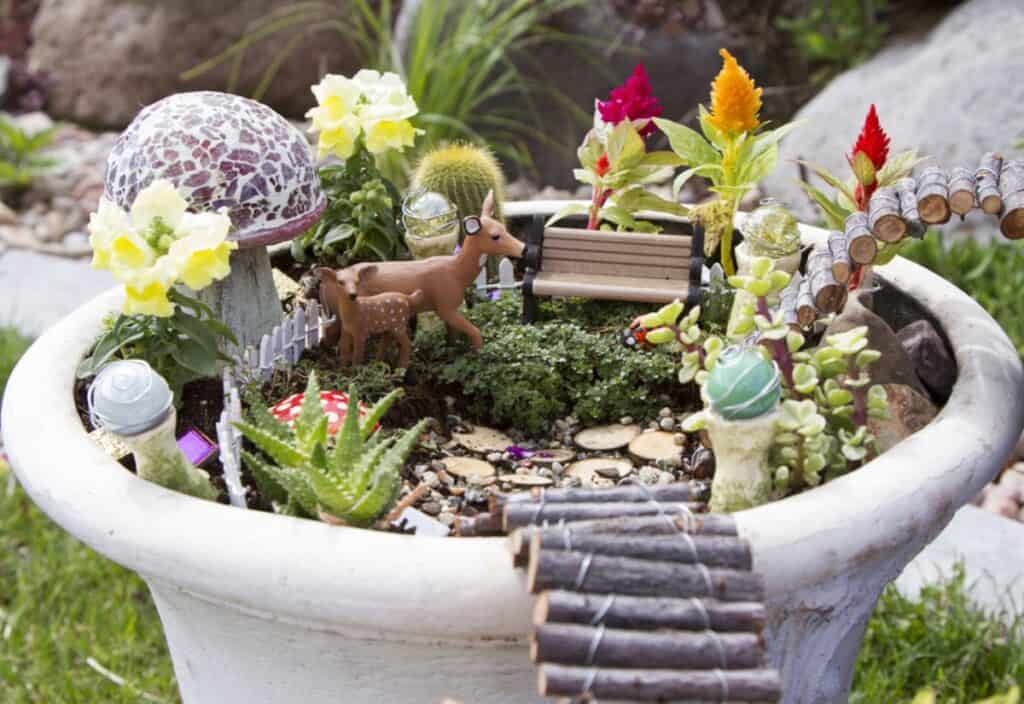Fairy gardens captivate the imagination, serving as miniature sanctuaries that offer a glimpse into a whimsical, enchanted world. These tiny landscapes are crafted to attract mythical fairy visitors, blending the allure of fantasy with the beauty of nature.

The creation of fairy gardens is not just an artistic endeavor, but also an act of fun and whimsy played out with plants. They allow both the young and the young at heart to indulge in creative play and storytelling. Turning even the smallest garden space into a place of respite. And who knows, if you add a door, you might just find the fairies will visit your garden.
Fairy gardens aren’t just for kids
Children, in particular, are drawn to the magic of fairy gardens. Often finding joy in the process of designing and constructing these miniature worlds. Their small hands and big imaginations are perfect for working with miniatures. And who doesn’t love a good outdoor play session?
However, they are not the only ones who can partake in this whimsical activity; people of all ages can find solace and inspiration in creating a fairy garden. This makes them a versatile project for families, educators or anyone seeking a touch of magic or a bit of simple living in their lives.
Siobhan Alvarez-Borland of Mimosas & Motherhood says, “Fairy gardens are especially magical for kids. Parents can use a wide variety of found and purchased pieces to form a fun landscape of small plants and trinkets designed to attract fairies to their garden. Even young children can help with the design!”
When to build fairy gardens
The best time to embark on creating a fairy garden is spring or early summer. In most climates, it’s the perfect time to take advantage of warmer weather and the garden’s full bloom. This timing allows the fairy garden to integrate seamlessly with the natural surroundings, enhancing its magical appeal.
Once you’ve built a fairy garden, you can revamp it every year. This year’s design doesn’t need to be next year’s. They offer an opportunity to continually reinvent the space and keep the magic alive season after season.
Remember, you can leave it exactly as it is, too. If you love it, once you’ve finished building it, you can repeat the design every year. There are no rules with these fun little gardens, they’re simply built from your heart’s desire.
Tamara of Thriving In Parenting says, “When the kids are out of school in summer, one of our cherished pastimes is building fairy gardens together. It’s such a magical way to spend warm days in the garden transporting your children to the imaginary world of fairies and little creatures.”
How to build your ideal fairy garden
Building a fairy garden is an exercise in imagination and resourcefulness. Choose a stump or a small little area in the garden and plant small flowers. Add pebbles or rocks for landscaping, and consider adding a small wooden fairy door to welcome the fairies. Remember, once a fairy door has been installed, it shouldn’t be touched again, or the fairies won’t come back.
Small dollhouse furniture sourced from thrift stores can serve as quaint additions to the garden. Recycled materials can be transformed into unique, handcrafted pieces, adding a personal touch to the fairy abode. These elements work together to create a scene that is both enchanting and environmentally conscious.
If you don’t have a lot of space to work with, think about using a second-hand flower pot to build something small that can be tucked into the corner of a patio or balcony. Fill it with violas or other tiny plants, rocks and little bits and bobs to decorate. These are great places to showcase favorite rocks, little pieces of driftwood or even a fossil.
Go bigger if that’s your style
If that’s not your style, fairy gardens can also be built in a small garden area surrounded by sunflowers, calendulas or even cosmos. In the middle of the flowers, there could be a spot to nestle in and read, or a bird bath or a gazing ball could be tucked inside the ring of flowers.
Again, remember that these gardens are built to express your whimsy. Build them into something you love, and you can’t go wrong.
Their size can range from expansive setups that sprawl across garden beds to more modest arrangements that brighten up small corners of outdoor areas. This flexibility ensures that anyone, regardless of the size of their outdoor space, can partake in the joy of creating a fairy garden, inviting a sense of wonder and enchantment into their environment.
Most importantly, have fun
As you embark on the adventure of creating your own fairy garden, remember that there are no strict guidelines, only suggestions to spark your creativity. Each fairy garden is as unique as its creator, and there’s no right or wrong way to bring it to life. It’s an opportunity to step away from screentime and connect with nature, share an activity with loved ones and craft a space that brings joy and a sense of wonder.
Laura Sampson of Little House Big Alaska is on a mission to teach modern family-oriented home cooks how to make old-fashioned foods new again. She shares her passion for home cooking, backyard gardening and homesteading on her website and blog.